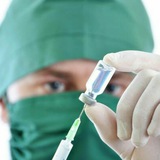تحليلة 3.pdf
976.3 KB
كيمياء تحليلية مرحلة اولى
ملزمة الثالثة 🙂
ملزمة الثالثة 🙂
Fundamentals of Analytical Chemistry Skoog.pdf
93.7 MB
🧪مصدر الكيمياء التحليلية🧪
Student Solutions Manual Fundamentals of Analytica.pdf
4.2 MB
🧪حلول مصدر الكيمياء التحليلية🧪
DISORDERS OF HEME METABOLISM
1⃣ Porphrias
✨ Diseases of heme biosynthesis characterized by
⚫️ increased excretion of porphyrins in urine and faces
⚫️ accumulation of porphrins in plasma and tissue
✨ they may be inherited or acquried due to deficiency of certain heme biosynthesis enzymes
✨ they are classified into two groups depend on organ or cells that are affected
🌸 ERYTHROPOIETIC PORPHYRIAS
are classified into:
1. Congenital erythropoietic porphyria
✨ Autosomal recessive
✨ Deficiency : uroporphyrinogen III synthase
✨ Result : accumulation and excretion of uroporphyrinogen I and coproporphyrinogen I in urine
( في الخطوة رقم 3 في تكوين heme يتكون uroporphyrinogen I تلقائي ومن ثم يتكون corproporphyrinogen I لذلك عند نقص uroporphyrinogen III synthase تتراكم في البول ولايتم تحويلها الى uroporphyrinogen III & corprophyrinogen III)
✨ Symptom :
🌻 Photosensitivity ➡️ due to light absorption property of porphyrins ➡️ porphyrins react with oxygen and generate free radicals ➡️ damage lysosomes and other cell structures
🌻 Pink teeth ➡️ due to formation of pink uro and corproporphurins
🌻Haemolytic anaemia
🌻Splenomegaly
✨ Treatment :
1⃣ Avoidance of sunlight
2⃣ Splenectomy
3⃣ High- level blood transfusions
4⃣ Maybe transplantation of bone marrow
2. Erythropoietic protoporphyria
✨ Autosomal dominant
✨ Deficiency : partial deficiency of ferrochelatase or heme synthase
✨ Result : excess protoporphyrin IX in plasma and erythrocytes and increased excration of protoporphyrin IX in feces
1⃣ Porphrias
✨ Diseases of heme biosynthesis characterized by
⚫️ increased excretion of porphyrins in urine and faces
⚫️ accumulation of porphrins in plasma and tissue
✨ they may be inherited or acquried due to deficiency of certain heme biosynthesis enzymes
✨ they are classified into two groups depend on organ or cells that are affected
🌸 ERYTHROPOIETIC PORPHYRIAS
are classified into:
1. Congenital erythropoietic porphyria
✨ Autosomal recessive
✨ Deficiency : uroporphyrinogen III synthase
✨ Result : accumulation and excretion of uroporphyrinogen I and coproporphyrinogen I in urine
( في الخطوة رقم 3 في تكوين heme يتكون uroporphyrinogen I تلقائي ومن ثم يتكون corproporphyrinogen I لذلك عند نقص uroporphyrinogen III synthase تتراكم في البول ولايتم تحويلها الى uroporphyrinogen III & corprophyrinogen III)
✨ Symptom :
🌻 Photosensitivity ➡️ due to light absorption property of porphyrins ➡️ porphyrins react with oxygen and generate free radicals ➡️ damage lysosomes and other cell structures
🌻 Pink teeth ➡️ due to formation of pink uro and corproporphurins
🌻Haemolytic anaemia
🌻Splenomegaly
✨ Treatment :
1⃣ Avoidance of sunlight
2⃣ Splenectomy
3⃣ High- level blood transfusions
4⃣ Maybe transplantation of bone marrow
2. Erythropoietic protoporphyria
✨ Autosomal dominant
✨ Deficiency : partial deficiency of ferrochelatase or heme synthase
✨ Result : excess protoporphyrin IX in plasma and erythrocytes and increased excration of protoporphyrin IX in feces
1) A suppository is generally intended for use in
a) Rectum
b) Vagina
c) Urethra
d) All the above
2) Vaginal suppositories also called as
a) Pessaries
b) Simple Suppositories
c) Bougies
d) None
3) Weight of rectal suppository for adults is
a) 1 g
b) 2 g
c) 5 g
d) None
4) Weight of rectal suppository for children is
a) 1 g
b) 2 g
c) 5 g
d) None
5) Urethral suppositories also called as
a) Pessaries
b) Bougies
c) Both
d) None
a) Rectum
b) Vagina
c) Urethra
d) All the above
2) Vaginal suppositories also called as
a) Pessaries
b) Simple Suppositories
c) Bougies
d) None
3) Weight of rectal suppository for adults is
a) 1 g
b) 2 g
c) 5 g
d) None
4) Weight of rectal suppository for children is
a) 1 g
b) 2 g
c) 5 g
d) None
5) Urethral suppositories also called as
a) Pessaries
b) Bougies
c) Both
d) None
6) Weight of urethral suppository for males & females respectively
a) 4 & 2
b) 2 & 4
c) 4 & 6
d) 6 & 4
7) The number of milligrams of KOH required neutralizing free acids & saponify the esters contained in 1g of fat is known as
a) Iodine value
b) Saponification value
c) Water number
d) Acid value
8) The number of grams of iodine that reacts with 100 g of fat is known as
a) Iodine value
b) Saponification value
c) Water number
d) Acid value
9) The number of milligrams of KOH required neutralizing free acids in 1 g of fat is known as
a) Iodine value
b) Saponification value
c) Hydroxil value
d) Acid value
10) The number of milligrams of KOH required neutralize the acidic acid used to acetylate 1 g of fat is known as
a) Iodine value
b) Saponification value
c) Hydroxil value
d) Acid value
a) 4 & 2
b) 2 & 4
c) 4 & 6
d) 6 & 4
7) The number of milligrams of KOH required neutralizing free acids & saponify the esters contained in 1g of fat is known as
a) Iodine value
b) Saponification value
c) Water number
d) Acid value
8) The number of grams of iodine that reacts with 100 g of fat is known as
a) Iodine value
b) Saponification value
c) Water number
d) Acid value
9) The number of milligrams of KOH required neutralizing free acids in 1 g of fat is known as
a) Iodine value
b) Saponification value
c) Hydroxil value
d) Acid value
10) The number of milligrams of KOH required neutralize the acidic acid used to acetylate 1 g of fat is known as
a) Iodine value
b) Saponification value
c) Hydroxil value
d) Acid value
